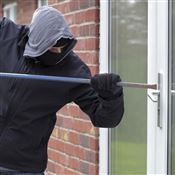23 Cheap Ways to Prevent Burglary
Protecting your home doesn't have to cost a fortune. Here are 23 practical ways to prevent burglary on the cheap (bonus: most of these are free).
 |
| © CreditDonkey |
More than 2 million homes are burglarized in the U.S. each year, and home security is a billion-dollar business. But with home security systems costing up to hundreds per year, it may be out of many families' budgets.
So how else can you effectively protect your family and home? Here is the good news: it doesn't have to cost a fortune to burglar-proof your home. In most cases, it just takes a little common sense and some simple steps to keep unwanted intruders away. Take some time to assess what may make your home attractive to thieves and identify weak spots in your security.
Here are 23 ways to ward off would-be thieves that won't put an unnecessary strain your wallet.
- Install dummy cameras
Research shows that when cameras or other surveillance equipment are present, burglars are less likely to consider targeting your home. But the equipment can easily cost hundreds or even thousands of dollars to purchase and install. Dummy cameras, on the other hand, are inexpensive and will fool thieves into thinking your home is monitored. - Be diligent about landscaping
A Department of Justice report found that homes are more at risk for burglary when they're hidden by overgrown hedges, trees, and shrubbery. Spending a Saturday doing yard work may be enough to stop a burglar — and it doesn't have to cost you a dime. - Install a cheap timer on the TV
Approximately 60% of burglaries occur during daytime hours when people are out of the house working or running errands. Spending a few bucks on a timer to switch on the TV or radio can give burglars the impression that your home is occupied, so they'll want to stay away. - Buy a motion sensor light
If you're worried about being burglarized at night, installing a motion sensor can increase your peace of mind without breaking the bank. You can find one for just $20 to $30. It's a fact that having outside lights around your entryway can decrease the odds of getting burglarized. - Change your routine
Studies show that burglars often target victims by studying their everyday movements. So make yourself unpredictable and change up your routine. Small changes, like leaving for work at a different time each day or varying when you run errands, make it harder for a burglar to pinpoint your movements. - Upgrade your locks (and use them)
Surprisingly, one-third of burglars enter a victim's home through the front door, while another 23% choose a first-floor window. If you live in an older home, shelling out a few dollars for some new locks makes getting in more of a challenge for burglars. If your home is newer, check all your entry points to make sure they're secure. - Snag some cheap security signs
Burglars will take a pass on entering a home when a security system is present 60% of the time, but spending big bucks on an alarm system isn't realistic for every budget. Instead, you can fool a burglar into thinking you have an alarm system with some fake security signs. Stores like Lowe's, Wal-Mart, or Home Depot sell them for only around $12 to $15 each. - Don't advertise your wealth
Statistically, burglars are more likely to target your home when obvious signs of wealth are present. If you've got an expensive car or other toys like a motorcycle or boat, stowing them in the garage or somewhere off-site may help you fly under a thief's radar. - Get to know your neighbors
Living in a newer neighborhood has been shown to increase burglary risk because criminals assume that people may be less likely to watch out for one another. So make some effort to get to know your neighbors, even just a simple "hello" each time you see them. It costs nothing and may just turn out to reduce the risk of burglary in your home and the area as a whole. - Add a dog to your family
Over half of burglars say that they'd pass on targeting a home where a dog is present. But buying and owning a dog usually requires a big financial investment. If you are interested in having a dog however, you could consider fostering one as a more budget-friendly alternative. Rescue organizations typically cover all the cost of veterinary care and in some cases, they may even pay you small a per diem for sheltering a needy animal. And plus, you'd be doing a good deed. - Or just pretend you did
If fostering a dog isn't doable, you can still scare off burglars with the threat of an attack from Fido by purchasing some inexpensive "Beware of Dog" signs and posting them prominently around your home's exterior. - Hide your valuables
Jewelry and cash are at the top of many burglar's lists, so be sure to stash them away, preferably in a safe where a thief can't get them. A small safe can be bought for less than $100, but just be sure to bolt it down so a burglar can't make off with it. - Rent out your driveway
Burglars want to break into homes when there's a good chance that no one will be home. So if you're going to be gone for a while, see if you can get someone to park in your driveway to give the illusion that the house is occupied. Or if street parking is hard to come by in your neighborhood, you could even consider renting it out and make a little extra cash in the process. Just be sure to check with your homeowner's association or landlord to make sure having an extra car around is okay. - Secure sliding glass doors
Sliding glass doors are especially attractive to burglars since they are easier to pry open than other type of door. If you've got one of these doors in your home, inserting a cheap wooden dowel in the track can make opening it more challenging for an intruder. - Keep vacation plans on the down low
If you're planning to head out of town for a while, the worst thing you can do is let all of your Facebook friends know. One study showed that nearly 80% of thieves use social media to track the movements of would-be targets before they strike. Also, refrain from posting vacation pictures until you're back home. - Close the curtains
Leaving the blinds or curtains open when you're away is a definite invitation to burglary. In an Australian study, 29% of burglars said they chose a particular home because the homeowners left valuables in plain sight. - Stash away spare keys
Putting a key under the mat is another big no-no if you want to prevent someone from breaking in. Nearly 11% of burglars in the Australian study said they were able to rob someone because keys were carelessly hidden. That's practically like inviting someone to rob your house! - Don't pick up after your kids
If you've got little ones running around, letting them keep their bikes or other toys on the front lawn may work to your advantage. One analysis showed that the greater number of people live in a home, the less likely it is that a burglar would choose it. - Lock up ladders
While the majority of burglars gain access at the ground floor level, some choose to enter through the second or third story. If you've got ladders or anything else a burglar could use to reach the next level of your home, make sure they're stowed away in a secure place. - Get a driveway alarm
If your home is set back from the main road, a lack of visibility could attract burglars. A driveway alarm can cost as little as $20 and you'll always know when someone is approaching the property. - Put a keyed lock on your garage door
Approximately 9% of burglars get into homes through the garage door. You could be more vulnerable if you have an older model that doesn't have a manual lock. Installing a padlock or deadbolt can cost $50 or less, and it's a small price to pay to keep your home safe. - Don't be so quick to open the door
One tactic thieves use to gauge whether a home is a good target is knocking on the door and engaging in a conversation with whomever answers. If you see a stranger approaching your doorstep, let them know you are home without opening the door and think twice before chatting them up. - Get a free home security check
Burglars are less likely to strike when there's a known police presence in the area. Asking an officer from your local department to come out and conduct a quick security audit can help you spot weak points, and it sends a signal to potential thieves that law enforcement is keeping an eye things.
BOTTOM LINE
 |
| © string_bass_dave (CC BY-SA 2.0) via Flickr |
There's no guaranteed way to keep a burglar from entering your home uninvited. But there is a lot you can do to minimize your chances of being victimized, even if you're working on a shoestring budget. As many of these examples have shown, sometimes you don't have to spend anything other than your time to make sure your home is protected.
Rebecca Lake is a journalist at CreditDonkey, a home security comparison and reviews website. Write to Rebecca Lake at rebecca@creditdonkey.com. Follow us on Twitter and Facebook for our latest posts.
Note: This website is made possible through financial relationships with some of the products and services mentioned on this site. We may receive compensation if you shop through links in our content. You do not have to use our links, but you help support CreditDonkey if you do.
|
|
|



